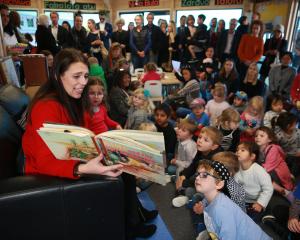
I popped into my college common room the other night to avail myself of the excellent new coffee machine, only to discover a dog-eared copy of Normal People lying amongst the empty wine glasses and tea-stained mugs.

The praise and veneration afforded to the young writer is almost unprecedented. But I must admit I am somewhat bewildered by the cult of Sally Rooney. I have read her three novels — Conversations with Friends, Normal People and, most recently, Beautiful World — and find myself struggling to understand the near-universal acclaim. To me, Rooney’s writing is pleasant enough, but in the way a lukewarm, overmilky hot chocolate is — a sweet way to pass the time, slightly satisfying, but swiftly forgotten.
Deriving its title from a Friedrich Schiller poem, Beautiful World is a sort of updated old-fashioned comedy of manners about four young adults. There’s Simon, a handsome political adviser, and Eileen, his on-and-off-again love interest; an editor and occasional writer for a small Dublin literary magazine. Then there’s perpetually grumpy warehouse worker Felix, who befriends a sharp-tongued, talented young novelist called Alice, who also happens to be Eileen’s best friend.
The novel meanders between Dublin and the seaside, as the four characters search for beauty in the world — through excruciatingly awkward Tinder dates, email exchanges, long-distance friendships, and alcohol-fuelled arguments. It is a ponderous novel wherein much discourse abounds regarding the collapse of civilisation, the death of beauty, the irrelevance of novels as an art form and the commodification of art. There’s also a lot of sex.
Many critics have noticed that the character of Alice bears a striking resemblance to Rooney herself. Both are young female Irish novelists, swiftly propelled to dizzy heights of literary fame with their ‘‘sensitive little novels about ‘real life’’’. Like Rooney has admitted in previous interviews, Alice struggles with her newfound success, complaining at one point: ‘‘They never tire of giving me awards, do they? It’s a shame I’ve tired so quickly of receiving them...’’ What a problem to have.
Unsympathetic parallels aside, Alice is actually an excellent case study of the dark side of celebrity. There is a certain pathos in her lack of privacy, and the prickling sense of invasion she constantly feels. ‘‘I keep encountering this person, who is myself,’’ Alice writes in an email to Eileen, ‘‘and I hate her with all my energy. I hate her ways of expressing herself, I hate her appearance, and I hate her opinions about everything. And yet when other people read about her, they believe that she is me. Confronting this fact makes me feel I am already dead.’’
There’s another thing about Rooney’s writing that I deeply admire: her ability to capture the perfect ordinariness — the casual mundanity — of everyday life. But again, this is a double-edged sword. There is something reassuringly grounding about watching a young labourer making himself a cup of breakfast tea while he quietly negotiates the complexities of a burgeoning romantic relationship. Yet too much attention paid to the scrape of spoon against chipped china or the pallid colour of the wallpaper can be exhausting.
Rather, Rooney is at her best when she turns from describing banal interiors to the ordinary sadness of her deeply human characters. Both Alice and Eileen, for example, hail from damaged and complex families. Alice is defensive, skeptical and self-critical, while Eileen jeopardises any romantic potential in fear of future disasters. Rooney’s quiet, short sentences deftly capture the awkwardness of intimacy, be it sexual or platonic.
I have never read another novelist who can quite articulate the painful exquisiteness of the blurred lines between a friendship and a relationship, or the unspoken jealousy one feels towards one’s more beautiful and successful friend, for whom one is also incredibly proud and happy. Rooney captures the frustration of things left unsaid, and the constant spirals of self-doubt and self-analysis.
Most prominently however, one is struck by the sparseness of Rooney’s writing style. Each sentence is short and precise; any colour or flair has been neatly excised. Such a ruthless economy imparts an air of correctness and self-awareness. There are no glaring mistakes in her prose, but neither is there any brilliance. Unlike anything written by Joan Didion, Toni Morrison, Raymond Carver or Margaret Atwood, one cannot easily identify Rooney in a short extract. The writing of the former authors consumes and delights the reader, whereas the writing of the latter is plain and unmemorable. Rooney’s writing lacks energy; she has wielded the scalpel to the point of removing all flesh and colour from the prose.
After so much thought and deliberation, I am left feeling somewhat ambivalent about Rooney. In Normal People, Connell muses on the act of writing: ‘‘It feels powerful to him to put an experience down in words, like he’s trapping it in a jar and it can never fully leave him.’’ Perhaps this is what I need to continue doing. I will carry on reading and ruminating upon Rooney’s work, and like Connell, I will delight in the satisfaction of capturing my vague and often undecided feelings on the page.
- Jean Balchin, a former English student at the University of Otago, is studying at Oxford University after being awarded a Rhodes Scholarship.
Comments
Sally sells lots of books and gives people lots of pleasure - perhaps without thinking about it too much. That's a noble purpose of literature in its own right, and it improves the human condition - For this reason I would have no problem with the next Nobel Prize in literature going to Mills and Boon rather than the author of some dense, impenetrable and socio-politically motivated tome - which is its more mainstream recipient. It would at least restore some sense of balance to this flagship of the literary world. If you can't handle Mills and Boon, then how about J.K. Rowling, who I'm sure has introduced millions of adolescents to the joys of literacy via the same 'low impact' route.
Oh...Balliols!
Text is received according to the Worldview of the reader. You can't diss the columnist for having an opinion that annoys you.












